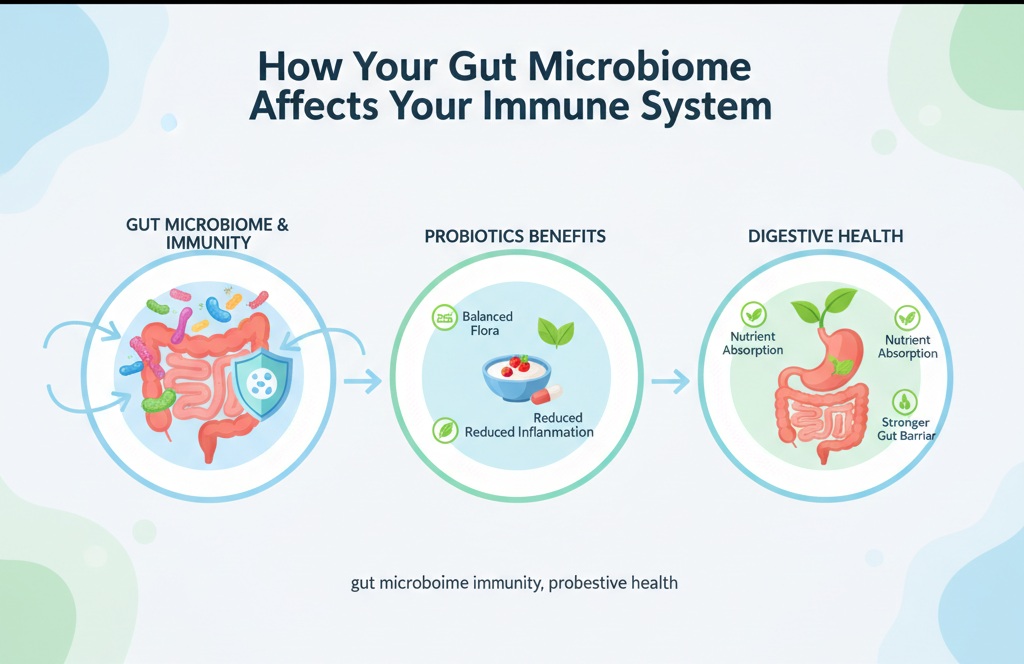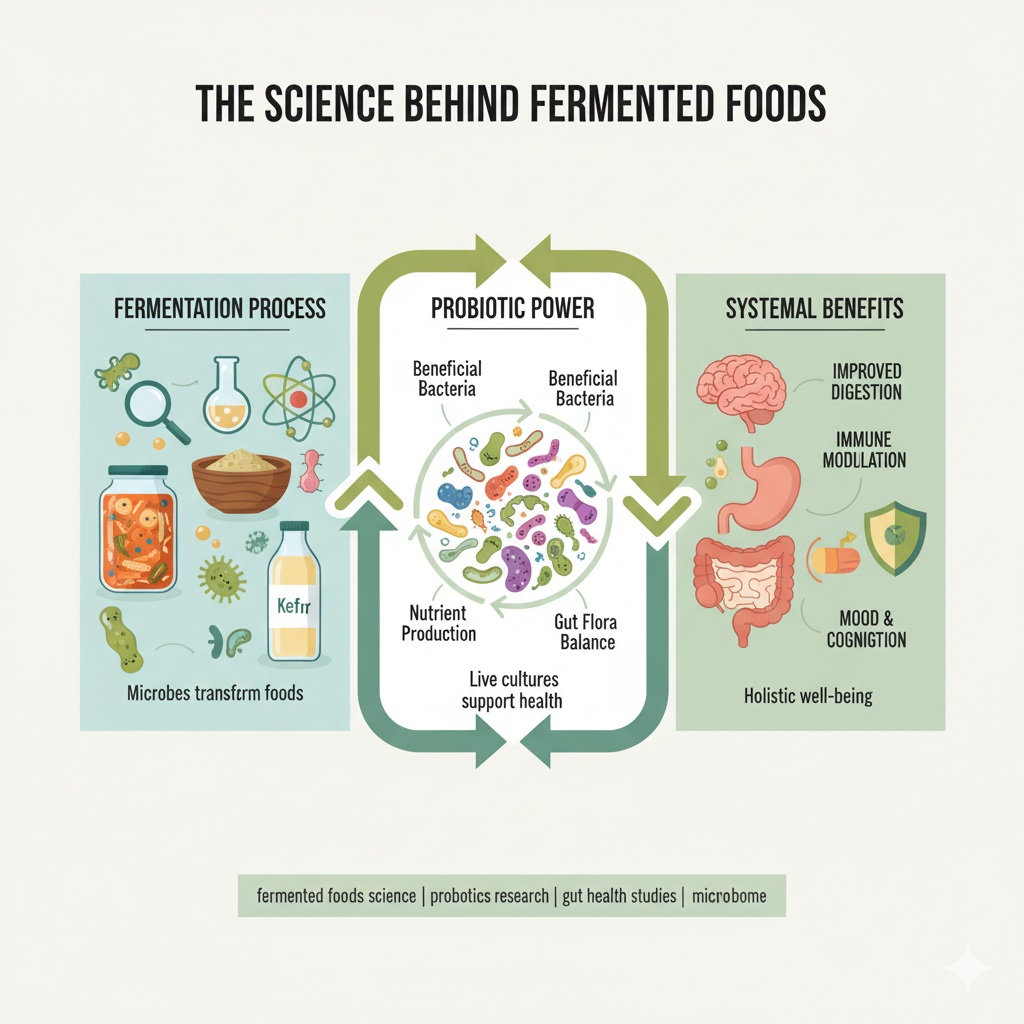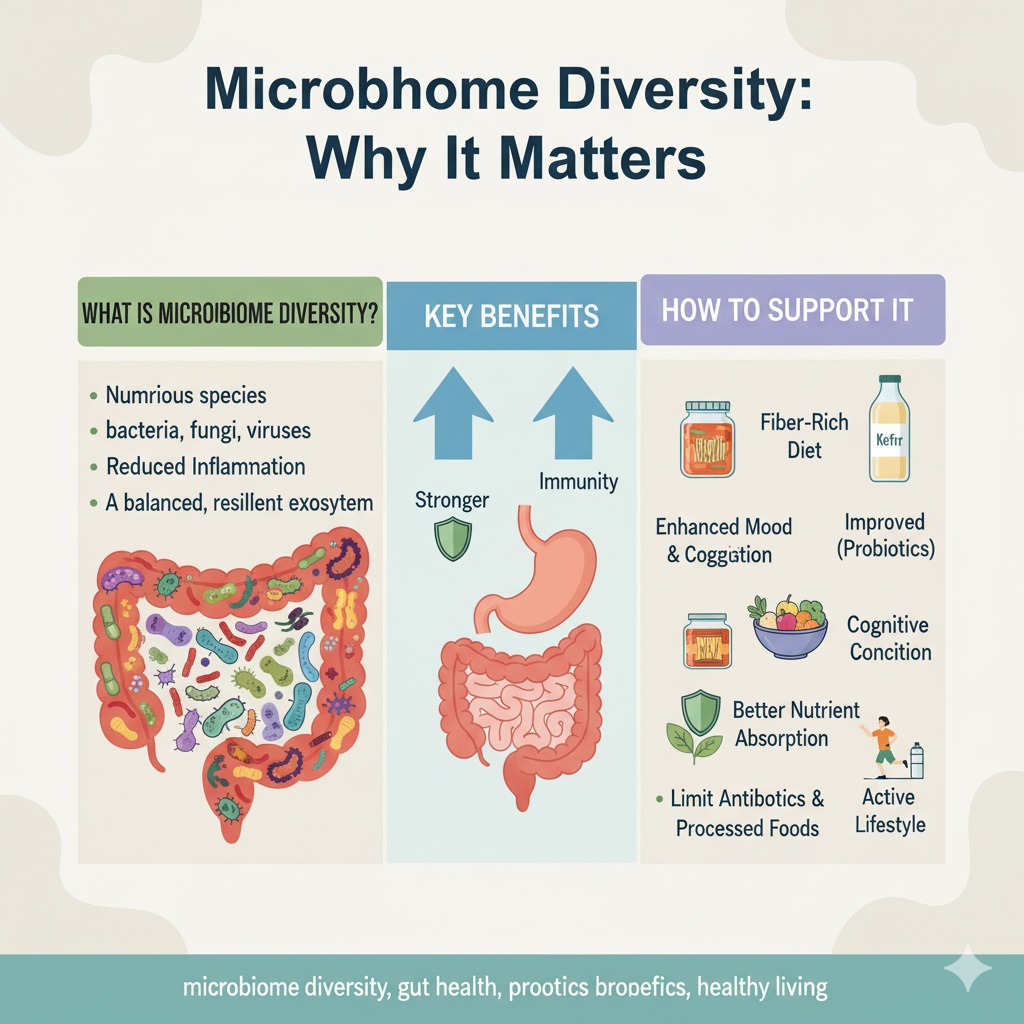Scientists have uncovered that nearly 70% of the immune system lives in the gut, where trillions of microorganisms known as the gut microbiome directly influence how the body fights infection and inflammation. Probiotics, prebiotics, and a balanced diet rich in fiber and fermented foods can strengthen immunity, reduce illness duration, and improve overall digestive health. Maintaining gut balance may be the most effective way to protect long-term wellness.
In recent years, scientists have discovered something truly remarkable — the trillions of bacteria living inside your gut may hold the key to how strong or weak your immune system is. This community of microorganisms, known as the gut microbiome, isn’t just about digestion; it’s a powerful driver of your body’s overall defense system.
From the foods you eat to the probiotics you take, every choice you make influences your immune balance. Let’s explore how your gut microbiome affects immunity, why digestive health matters more than you think, and how you can naturally support your body’s built-in shield.
1. What Is the Gut Microbiome?
The gut microbiome is a complex ecosystem of bacteria, viruses, fungi, and other microorganisms living in your digestive tract. While that might sound unsettling, these microbes are actually essential allies. They help you:
- Break down food and absorb nutrients
- Produce vital vitamins like B12 and K
- Regulate metabolism
- Protect the gut lining
- Communicate with your immune system
Interestingly, your gut microbiome is as unique as your fingerprint. Lifestyle, diet, stress, and even sleep can shape which bacteria thrive — and which don’t.
When the balance between “good” and “bad” bacteria shifts (a condition called dysbiosis), your immune function can suffer, making you more prone to infections, allergies, and inflammation.
2. How the Gut and Immune System Communicate
Did you know that around 70% of your immune system lives in your gut? That’s because your intestines contain a vast network of immune cells constantly interacting with gut bacteria.
Here’s how this partnership works:
- Gut bacteria train immune cells.
From infancy, microbes “educate” immune cells to recognize which invaders are dangerous and which are harmless. - They produce signaling molecules.
Friendly bacteria release compounds like short-chain fatty acids (SCFAs) — especially butyrate — that reduce inflammation and strengthen immune tolerance. - They protect the gut barrier.
A healthy gut lining acts like a security wall, preventing harmful microbes from entering the bloodstream and triggering immune overreactions.
When your microbiome is balanced, your immune system stays calm and alert. But if your gut bacteria become imbalanced, that same system can turn chaotic, leading to chronic inflammation or autoimmune responses.
3. Probiotics and Their Benefits for Immunity
One of the best-known ways to support gut health is through probiotics — live microorganisms that provide health benefits when consumed in adequate amounts.
Key Probiotic Benefits Include:
- Boosting immune defense: Certain probiotic strains (like Lactobacillus and Bifidobacterium) stimulate the production of natural antibodies.
- Fighting harmful bacteria: They crowd out pathogens, reducing the risk of infections.
- Balancing inflammation: Probiotics help control excessive immune reactions that contribute to allergies and autoimmune conditions.
- Improving digestion: They aid nutrient absorption and reduce symptoms like bloating, gas, or constipation.
Clinical studies have shown that regular intake of probiotics can reduce the duration of colds, enhance vaccine effectiveness, and support recovery from antibiotic use.
4. The Role of Prebiotics: Food for Friendly Bacteria
If probiotics are the “soldiers” of gut health, then prebiotics are their fuel. Prebiotics are types of dietary fiber that feed beneficial bacteria, helping them grow stronger.
Top Prebiotic Foods:
- Bananas
- Garlic and onions
- Asparagus
- Oats
- Apples
By combining probiotics and prebiotics — known as synbiotics — you create the perfect environment for a thriving gut microbiome and robust immune defense.
5. Digestive Health and Immunity: Why It All Connects
When your digestive system runs smoothly, your immune system doesn’t have to work overtime. But when digestion is sluggish or your gut lining becomes inflamed, your body interprets it as a threat.
Signs Your Gut Health May Be Affecting Immunity:
- Frequent colds or infections
- Food sensitivities
- Bloating and indigestion
- Fatigue or “brain fog”
- Skin issues like eczema or acne
Addressing these early can help restore balance before chronic inflammation takes hold.
6. How to Naturally Strengthen Your Gut-Immune Connection
You don’t need expensive supplements to improve your microbiome. Simple, consistent lifestyle choices can make a big difference.
Practical Tips:
- Eat a diverse, fiber-rich diet.
Aim for colorful fruits, vegetables, legumes, and whole grains — they encourage microbial diversity. - Add fermented foods.
Yogurt, kefir, kimchi, sauerkraut, and kombucha introduce live probiotics naturally. - Stay hydrated.
Proper hydration supports digestion and nutrient absorption. - Limit processed foods and sugar.
These feed harmful bacteria and increase inflammation. - Manage stress.
Chronic stress disrupts gut bacteria balance and weakens immune response. Try deep breathing, walking, or mindfulness. - Sleep well.
Poor sleep harms both your microbiome and immune system. Aim for 7–8 hours nightly.
7. Product & Supplement Suggestions
If you prefer to support your gut health through products, look for high-quality probiotics with multiple strains and at least 10 billion CFUs (colony-forming units).
💡 Example picks:
- Daily Probiotic Complex (with Lactobacillus acidophilus and Bifidobacterium bifidum)
- Prebiotic Fiber Powder made from inulin or chicory root
- Fermented foods kit — for making your own gut-friendly recipes at home
Always consult your healthcare provider before starting supplements, especially if you have existing health conditions.
8. The Future of Gut-Immune Research
The connection between gut microbiome and immunity is one of the fastest-growing areas in medical research. Scientists are exploring microbiome-based therapies to:
- Boost vaccine responses
- Manage autoimmune diseases
- Improve mental health through the gut-brain axis
As discoveries unfold, one thing is clear: maintaining a healthy gut isn’t just about digestion — it’s about protecting your entire body.
Conclusion: Your Gut Is Your Immune Powerhouse
Your gut microbiome is more than a group of microbes — it’s a living, intelligent network that constantly interacts with your immune system. A nourished gut means a stronger defense, better digestion, and more energy for life.
By focusing on probiotic benefits, digestive health, and balanced nutrition, you can build a foundation for long-term wellness. Remember: when you take care of your gut, your gut takes care of you.




